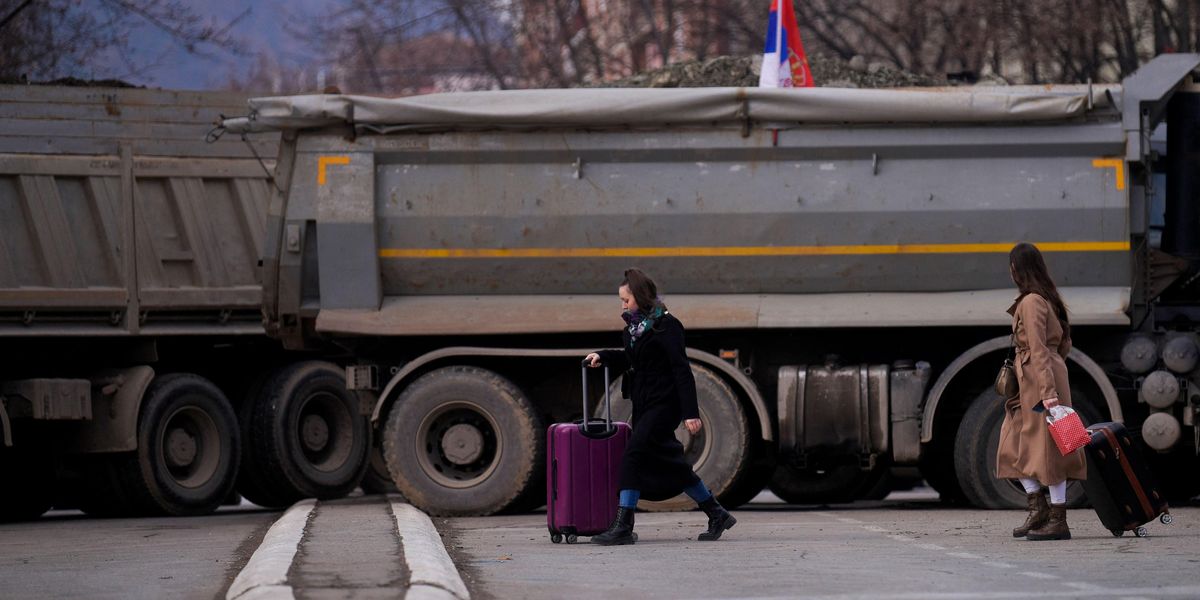
Kosovo shut down its largest border crossing with Serbia on Wednesday, underscoring the extent to which tensions between the two Balkan countries are rising.
Albanian-majority Kosovo declared independence from Serbia in 2008 with Western support, roughly a decade after North Atlantic Treaty Organization (NATO) forces intervened and carried out a bombing campaign on behalf of ethnic Albanians during a 1998-1999 civil war.
Serbia has refused to recognize the statehood of its former province, however. Instead, according toAgence France-Presse, Belgrade has encouraged 120,000 ethnic Serbs living in Kosovo to defy Pristina's authority—especially in northern Kosovo where Serbs constitute the majority.
According toAl Jazeera: "About 50,000 Serbs living in ethnically divided northern Kosovo refuse to recognize the government in Pristina or the status of Kosovo as a country separate from Serbia. They have the support of many Serbs in Serbia and its government."
As AFP reported:
The latest trouble erupted on December 10, when ethnic Serbs put up barricades to protest the arrest of an ex-policeman suspected of being involved in attacks against ethnic Albanian police officers—effectively sealing off traffic on two border crossings.
After the roadblocks were erected, Kosovar police and international peacekeepers were attacked in several shooting incidents, while the Serbian armed forces were put on heightened alert this week.
Late Tuesday, dozens of demonstrators on the Serbian side of the border used trucks and tractors to halt traffic leading to Merdare, the biggest crossing between the neighbors—a move which forced Kosovo police to close the entry point on Wednesday.
Due to recent border blockades and closures, just three entry points between the two countries remain open. The obstructions are "preventing thousands of Kosovars who work elsewhere in Europe from returning home for holidays," Al Jazeera noted.
"Kosovo's government has asked NATO's peacekeeping force for the country, the approximately 4,000-strong KFOR, to clear the barricades" erected on its side of the border, the news outlet reported. "KFOR has no authority to act on Serbian soil."
KFOR commander Major General Angelo Michele Ristuccia said Wednesday in a statement that "it is paramount that all involved avoid any rhetoric or actions that can cause tensions and escalate the situation."
"Solutions should be sought through dialogue," he added.
On Tuesday, Kosovo Interior Minister Xhelal Sveçla accused Serbia, under the influence of Russia, of trying to destabilize its former province by supporting ethnic Serbs who have been demonstrating for weeks in northern Kosovo.
According to Al Jazeera:
Serbia denies it is trying to destabilize its neighbor and says it only wants to protect the Serbian minority living in what is now Kosovan territory... not recognized by Belgrade.
Moscow said on Wednesday that it supported Serbia's attempts to protect ethnic Serbs in northern Kosovo but denied Pristina's accusation that Russia was somehow stoking tensions in an attempt to sow chaos across the Balkans.
Kremlin spokesperson Dmitry Peskov called it "wrong" to blame Moscow for escalating tensions between Kosovo and Serbia.
"Serbia is a sovereign country, and naturally, it protects the rights of Serbs who live nearby in such difficult conditions, and naturally reacts harshly when these rights are violated," said Peskov.
"Having very close allied relations, historical and spiritual relations with Serbia, Russia is very closely monitoring what is happening, how the rights of Serbs are respected and ensured," he added. "And, of course, we support Belgrade in the actions that are being taken."
In a joint statement released Wednesday, the European Union and the United States called on all parties "to exercise maximum restraint, to take immediate action to unconditionally de-escalate the situation, and to refrain from provocations, threats, or intimidation."
Serbian Defense Minister Miloš Vučević on Wednesday described the barricades as a "democratic and peaceful" means of protest and said that Belgrade has "an open line of communication" with Western diplomats on resolving the issue.
"We are all worried about the situation and where all this is going," said Vučević. "Serbia is ready for a deal."
As AFP reported, "Northern Kosovo has been on edge since November when hundreds of ethnic Serb workers in the Kosovo police as well as the judicial branch, including judges and prosecutors, walked off the job."
"They were protesting a controversial decision to ban Serbs living in Kosovo from using Belgrade-issued vehicle license plates—a policy that was eventually scrapped by Pristina," the news agency noted. "The mass walkouts created a security vacuum in Kosovo, which Pristina tried to fill by deploying ethnic Albanian police officers in the region."
This content originally appeared on Common Dreams and was authored by Kenny Stancil.
Kenny Stancil | Radio Free (2022-12-28T17:06:26+00:00) Kosovo Closes Main Border With Serbia Amid Protests, Rising Tensions. Retrieved from https://www.radiofree.org/2022/12/28/kosovo-closes-main-border-with-serbia-amid-protests-rising-tensions/
Please log in to upload a file.
There are no updates yet.
Click the Upload button above to add an update.